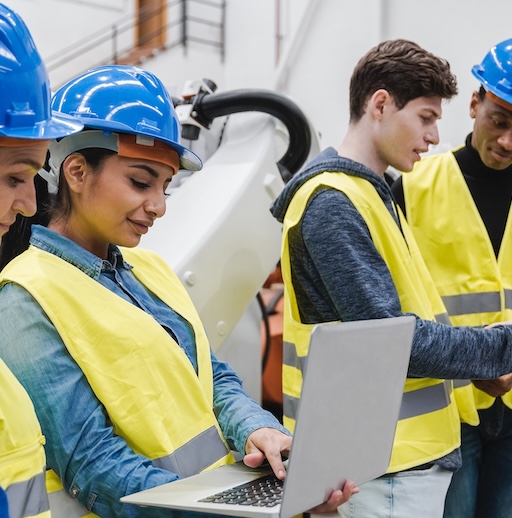
As the hybrid work model and digital tools quickly evolve, there’s a growing need for facility and maintenance leadership focused on planning, tech integration, and creating a better employee experience.
Key takeaways
- Future leaders in facility and maintenance must integrate new technologies, especially AI, to enhance workplace efficiency and employee experiences: Success depends on understanding how to leverage AI for better data analysis and decision-making
- Strong communication skills, both with human colleagues and AI systems, are crucial for effective collaboration and problem-solving: Leaders should be able to articulate their ideas clearly and work seamlessly with both people and technology
- Cultivating emotional intelligence and a continuous learning mindset is essential for staying adaptable and relevant: Leaders who are self-aware and open to learning can better navigate the challenges of the digital age and foster a positive work culture
In fact, three out of four professional and financial services firms have either hired or are looking to hire digital workplace leaders to help guide this transition, according to the 2025 Workplace Index report.
At the same time, AI is starting to play a bigger role in many aspects of workspace management. While 77% of organizations say they plan to use AI to enhance employee experience, more than half admit their teams don’t yet have the skills to make the most of these tools, according to the same report.
That gap highlights the need for upskilling and ongoing learning, making personal growth and development a key part of what it means to lead in today’s workplace.
Self-improvement as a concept: A short history
The idea of self-improvement has been around for centuries, though it’s taken many forms depending on the era. In ancient Greece, philosophers like Socrates and Aristotle emphasized the pursuit of virtue and wisdom as a lifelong journey.
The goal wasn’t just to be smarter. It was to live a better, more meaningful life. In the Enlightenment, thinkers like Benjamin Franklin kept detailed logs of personal habits and moral goals, treating self-improvement almost like a science experiment.
In the modern era, especially after World War II, self-improvement began to evolve into a more structured and widely accessible movement. Psychology, personal development literature, and later digital tools helped make the movement more mainstream.
Rather than being seen as a niche or philosophical pursuit, self-improvement became something people could actively work on in their daily lives.
Personal development starts with self-awareness
Personal development and self-awareness are essential for facility and workplace leaders. When leaders understand their own strengths, they’re better equipped to guide teams, make informed decisions, and foster a positive work culture.
In episode 365 of the Workplace Innovator podcast, “’What You Can Bring to the Table’ – Professional Development in Your Facility Management Journey,” Richard Peterson, CFM, FMP, SFP, suggests some of the first questions to ask when trying to determine strengths, including, “Are you especially intelligent? Are you conscientious? Are you a people person? Do you have communication skills, you know, grit, resilience?”
What about what you don’t bring to the table?
Equally important is recognizing and managing your weaknesses. Leadership is not about being perfect. Instead, it’s about being aware. The things we struggle with often have deeper roots, and learning to navigate them is part of the growth process.
Barry Conchie, author of a book on leadership and performance, explores this idea in the Workplace Innovator podcast episode “’Your Best Strengths’ – The Five Talents That Really Matter in Leadership and the Workplace.”
He emphasizes that while it’s important to be aware of your weaknesses, the focus should be on managing them rather than trying to improve them.
“You should pay attention to things that you don’t do well. You should certainly look to manage things that you don’t do well, but there’s a reason why you don’t do them well.”
The approach relies on the idea that the return on investment from focusing purely on weaknesses is minimal and does not contribute to building world-class organizations.
What are the pros and cons of strengths and weaknesses?
When it comes to personal and professional growth, there’s an ongoing debate on whether it’s better to double down on your strengths or invest time in improving your weaknesses. Both approaches have their advocates, but research offers some insights into how each strategy can impact performance, engagement, and leadership effectiveness.
The benefits of focusing on strengths include:
- Higher engagement and performance: Gallup research shows employees who focus on their strengths are more confident, self-aware, and productive. This leads to better engagement and lower turnover
- Positive emotional impact: Strengths-based strategies often result in feelings of joy, energy, and motivation, which can enhance creativity and problem-solving
- Improved workplace outcomes: A 2024 study found that strengths interventions significantly boosted job performance, organizational citizenship behavior, and engagement when strengths use increased over time
While the drawbacks can include:
- Risk of overconfidence: Overemphasizing strengths can lead to inflated egos or toxic behavior if not balanced with humility and accountability
- Neglect of critical weaknesses: Some weaknesses, especially those that impact team dynamics or leadership effectiveness, need attention. Ignoring them can hinder growth or cause blind spots
- Limited adaptability: Relying solely on strengths may reduce flexibility in roles that require a broader skill set or cross-functional capabilities
- In the end, while strengths-based approaches do have a lot of support, there’s also research that shows a mixed model that encourages strengths development while managing key weaknesses may be most effective, allowing individuals to thrive while still addressing areas that could limit their impact or collaboration.
Strategy for growth: Continuous learning
An important element of self-improvement is continuous learning, which helps people stay adaptable and relevant in a fast-changing work environment. Whether it’s gaining new technical skills, deepening emotional intelligence, or simply staying curious, the habit of learning fuels growth and opens new opportunities for impact and collaboration.
For facility and maintenance managers, that often means understanding new technologies and finding ways to leverage them.
In “’Create a Culture’ – Embracing Continuous Workplace Innovation at WORKTECH New York,” Philip Ross, founder and CEO of UnGroup, suggests the integration of AI in workplaces will significantly reshape employee experiences and collaboration.
Part of his work focuses on the conversational nature of our interactions with AI. “As we’re having a conversation now, we will be talking to our agentic agents and our AI experts in a very similar fashion.”
In fact, on an Asset Champion podcast episode, Ab DeWeese, author of “Essential AI: Your All-in-One QuickStart to Using AI in Business and The Workplace,” says effective communication with AI systems is becoming a critical skill for success.
So, he encourages daily practice. “The only way you can do that is just to spend time every day interacting with these different things, whether they’re for cute little projects or for planning a vacation or planning a meal for a family, just spend time conversing with them.”
Stay on top of the trends in intelligent worktech and facility management
Staying informed on the latest industry developments is critical for professional success. Workplace and facility management are constantly evolving with new technologies, regulations, and best practices, so staying well-informed is a key differentiator.
For more videos, podcasts, and webinars to keep you updated on the latest trends, visit our resource page.









